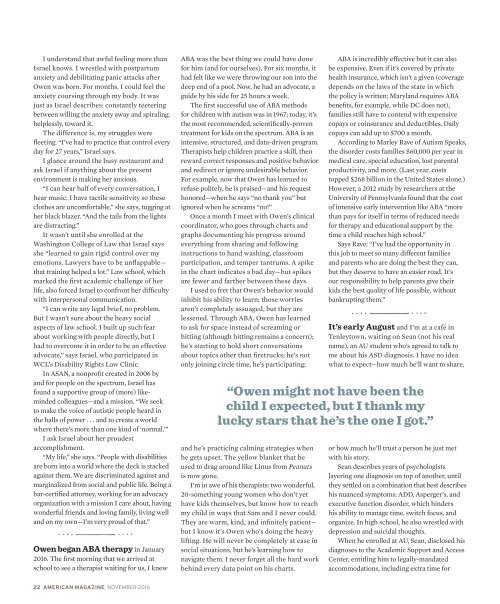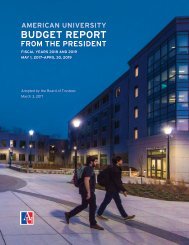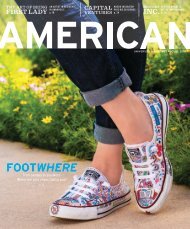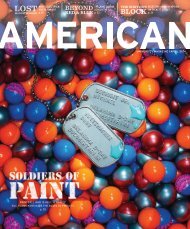American Magazine: November 2016
In this issue, delve into the Scandal-ous life of Judy Smith, meet ESPN’s new public editor, reflect on a decade of transformation under President Neil Kerwin, and learn more about autism—the fastest growing developmental disorder in the United States. Hop on the Metro to Capitol South and get to know a few of AU’s 1,068 Seattle transplants.
In this issue, delve into the Scandal-ous life of Judy Smith, meet ESPN’s new public editor, reflect on a decade of transformation under President Neil Kerwin, and learn more about autism—the fastest growing developmental disorder in the United States. Hop on the Metro to Capitol South and get to know a few of AU’s 1,068 Seattle transplants.
You also want an ePaper? Increase the reach of your titles
YUMPU automatically turns print PDFs into web optimized ePapers that Google loves.
I understand that awful feeling more than<br />
Israel knows. I wrestled with postpartum<br />
anxiety and debilitating panic attacks after<br />
Owen was born. For months, I could feel the<br />
anxiety coursing through my body. It was<br />
just as Israel describes: constantly teetering<br />
between willing the anxiety away and spiraling,<br />
helplessly, toward it.<br />
The difference is, my struggles were<br />
fleeting. “I’ve had to practice that control every<br />
day for 27 years,” Israel says.<br />
I glance around the busy restaurant and<br />
ask Israel if anything about the present<br />
environment is making her anxious.<br />
“I can hear half of every conversation, I<br />
hear music. I have tactile sensitivity so these<br />
clothes are uncomfortable,” she says, tugging at<br />
her black blazer. “And the tails from the lights<br />
are distracting.”<br />
It wasn’t until she enrolled at the<br />
Washington College of Law that Israel says<br />
she “learned to gain rigid control over my<br />
emotions. Lawyers have to be unflappable—<br />
that training helped a lot.” Law school, which<br />
marked the first academic challenge of her<br />
life, also forced Israel to confront her difficulty<br />
with interpersonal communication.<br />
“I can write any legal brief, no problem.<br />
But I wasn’t sure about the heavy social<br />
aspects of law school. I built up such fear<br />
about working with people directly, but I<br />
had to overcome it in order to be an effective<br />
advocate,” says Israel, who participated in<br />
WCL’s Disability Rights Law Clinic.<br />
In ASAN, a nonprofit created in 2006 by<br />
and for people on the spectrum, Israel has<br />
found a supportive group of (more) likeminded<br />
colleagues—and a mission. “We seek<br />
to make the voice of autistic people heard in<br />
the halls of power . . . and to create a world<br />
where there’s more than one kind of ‘normal.’”<br />
I ask Israel about her proudest<br />
accomplishment.<br />
“My life,” she says. “People with disabilities<br />
are born into a world where the deck is stacked<br />
against them. We are discriminated against and<br />
marginalized from social and public life. Being a<br />
bar-certified attorney, working for an advocacy<br />
organization with a mission I care about, having<br />
wonderful friends and loving family, living well<br />
and on my own—I’m very proud of that.”<br />
Owen began ABA therapy in January<br />
<strong>2016</strong>. The first morning that we arrived at<br />
school to see a therapist waiting for us, I knew<br />
ABA was the best thing we could have done<br />
for him (and for ourselves). For six months, it<br />
had felt like we were throwing our son into the<br />
deep end of a pool. Now, he had an advocate, a<br />
guide by his side for 25 hours a week.<br />
The first successful use of ABA methods<br />
for children with autism was in 1967; today, it’s<br />
the most recommended, scientifically-proven<br />
treatment for kids on the spectrum. ABA is an<br />
intensive, structured, and data-driven program.<br />
Therapists help children practice a skill, then<br />
reward correct responses and positive behavior<br />
and redirect or ignore undesirable behavior.<br />
For example, now that Owen has learned to<br />
refuse politely, he is praised—and his request<br />
honored—when he says “no thank you” but<br />
ignored when he screams “no!”<br />
Once a month I meet with Owen’s clinical<br />
coordinator, who goes through charts and<br />
graphs documenting his progress around<br />
everything from sharing and following<br />
instructions to hand washing, classroom<br />
participation, and temper tantrums. A spike<br />
in the chart indicates a bad day—but spikes<br />
are fewer and farther between these days.<br />
I used to fret that Owen’s behavior would<br />
inhibit his ability to learn; those worries<br />
aren’t completely assuaged, but they are<br />
lessened. Through ABA, Owen has learned<br />
to ask for space instead of screaming or<br />
hitting (although hitting remains a concern);<br />
he’s starting to hold short conversations<br />
about topics other than firetrucks; he’s not<br />
only joining circle time, he’s participating;<br />
ABA is incredibly effective but it can also<br />
be expensive. Even if it’s covered by private<br />
health insurance, which isn’t a given (coverage<br />
depends on the laws of the state in which<br />
the policy is written; Maryland requires ABA<br />
benefits, for example, while DC does not),<br />
families still have to contend with expensive<br />
copays or coinsurance and deductibles. Daily<br />
copays can add up to $700 a month.<br />
According to Marley Rave of Autism Speaks,<br />
the disorder costs families $60,000 per year in<br />
medical care, special education, lost parental<br />
productivity, and more. (Last year, costs<br />
topped $268 billion in the United States alone.)<br />
However, a 2012 study by researchers at the<br />
University of Pennsylvania found that the cost<br />
of intensive early intervention like ABA “more<br />
than pays for itself in terms of reduced needs<br />
for therapy and educational support by the<br />
time a child reaches high school.”<br />
Says Rave: “I’ve had the opportunity in<br />
this job to meet so many different families<br />
and parents who are doing the best they can,<br />
but they deserve to have an easier road. It’s<br />
our responsibility to help parents give their<br />
kids the best quality of life possible, without<br />
bankrupting them.”<br />
It’s early August and I’m at a café in<br />
Tenleytown, waiting on Sean (not his real<br />
name), an AU student who’s agreed to talk to<br />
me about his ASD diagnosis. I have no idea<br />
what to expect—how much he’ll want to share,<br />
“Owen might not have been the<br />
child I expected, but I thank my<br />
lucky stars that he’s the one I got.”<br />
and he’s practicing calming strategies when<br />
he gets upset. The yellow blanket that he<br />
used to drag around like Linus from Peanuts<br />
is now gone.<br />
I’m in awe of his therapists: two wonderful,<br />
20-something young women who don’t yet<br />
have kids themselves, but know how to reach<br />
my child in ways that Sam and I never could.<br />
They are warm, kind, and infinitely patient—<br />
but I know it’s Owen who’s doing the heavy<br />
lifting. He will never be completely at ease in<br />
social situations, but he’s learning how to<br />
navigate them. I never forget all the hard work<br />
behind every data point on his charts.<br />
or how much he’ll trust a person he just met<br />
with his story.<br />
Sean describes years of psychologists<br />
layering one diagnosis on top of another, until<br />
they settled on a combination that best describes<br />
his nuanced symptoms: ADD, Asperger’s, and<br />
executive function disorder, which hinders<br />
his ability to manage time, switch focus, and<br />
organize. In high school, he also wrestled with<br />
depression and suicidal thoughts.<br />
When he enrolled at AU, Sean, disclosed his<br />
diagnoses to the Academic Support and Access<br />
Center, entitling him to legally-mandated<br />
accommodations, including extra time for<br />
22 AMERICAN MAGAZINE NOVEMBER <strong>2016</strong>

















